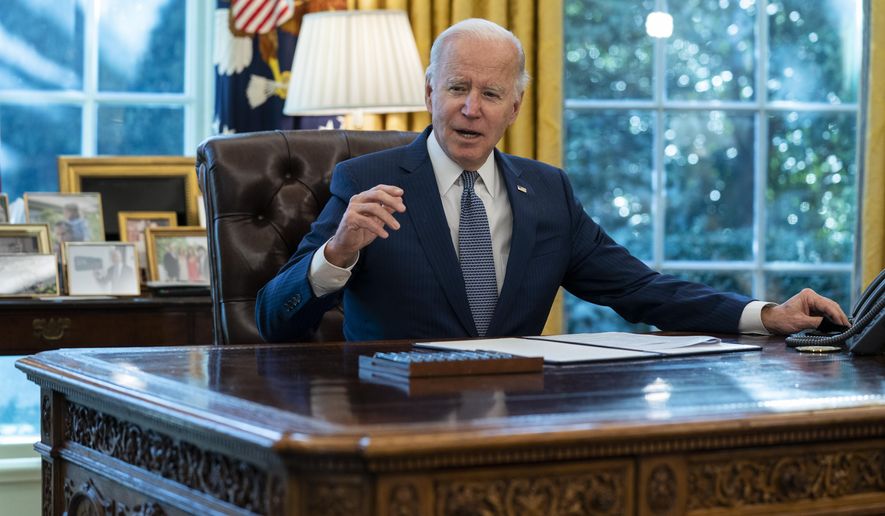President Biden plans to pay for some of the massive spending in his social welfare and climate bill by cutting billions of dollars from hospitals in Republican-led states.
The plan punishes the 12 red states that haven’t expanded Medicaid by slashing $3.4 billion in federal funding for hospitals to treat the poor. Instead, the money goes toward a $73.9 billion expansion of the Affordable Care Act.
“It’s extremely punitive to the hospitals that have been on the front lines,” said Mary Mayhew, president of the Florida Hospital Association.
Florida is one of 12 states where Mr. Biden and congressional Democrats propose cutting funding for hospitals that treat people who don’t have insurance or use Medicaid. The government program for the poor doesn’t fully reimburse hospitals for medical care.
Sen. Rick Scott, Florida Republican, said Democrats plan to cut health care for low-income families in red states and restore federal income tax deductions for state and local taxes. The deductions mostly benefit higher-income taxpayers in blue states.
“It doesn’t add up,” he said in an interview. “I just think that it’s evil. It’s mean-spirited. The Democrats are taking care of the people in New York or Illinois or Connecticut and taking advantage of the people in places like Florida or Texas.”
The funding cuts could force hospitals reeling financially from the COVID-19 pandemic to make tough decisions about how many low-income children or mental health patients get care.
The cuts also could be viewed as an incentive for the 12 states to participate in the expansion of Medicaid to include more low-income people. The expansion of Obamacare also could help offset the hospital cuts, but experts say the extent is unclear.
Congress’ top Democrats, House Speaker Nancy Pelosi of California and Senate Majority Leader Charles E. Schumer of New York, did not respond to requests for comment.
Several Democratic lawmakers in states facing cuts have publicly opposed the proposal.
Sens. Raphael G. Warnock and Jon Ossoff of Georgia have urged Mrs. Pelosi and Mr. Schumer to remove the hospital cuts from the bill.
“Reducing federal funds to hospitals and providers can be detrimental to their survival, and in the midst of a global pandemic, we should not be imposing additional financial constraints,” they said in a letter, which Georgia’s six Democratic House members also signed.
Yet neither Mr. Warnock nor Mr. Ossoff threatened to block the roughly $1.75 trillion bill.
Under Mr. Biden’s proposal, more low-income people would be eligible for Affordable Care Act subsidies for health insurance in the 12 Republican-led states that have opted out of the Medicaid expansion.
Alabama, Florida, Georgia, Kansas, Mississippi, North Carolina, South Carolina, South Dakota, Tennessee, Texas, Wisconsin and Wyoming have not expanded Medicaid.
The Kaiser Family Foundation, a nonprofit health policy research organization, said more than 2 million people nationally are expected to gain medical coverage from the Obamacare expansion included in Mr. Biden’s Build Back Better bill.
That could reduce the hit to hospitals for treating the uninsured, but Kaiser hasn’t determined whether their budgets would break even or lose money.
Even if hospitals don’t lose more money by treating uninsured patients, they would lose needed funding to deal with extra expenses related to the pandemic, according to national representatives.
Paying for the social welfare package “should not come at the expense of vital funding to facilities located in those parts of the country, especially at a time when hospitals are still providing care due to the COVID-19 pandemic and the deadly delta variant,” the American Hospital Association and six other groups representing hospitals said in a letter to Mrs. Pelosi and Mr. Schumer.
Even if fewer patients are uninsured, the federal funding would help hospitals deal with the $54 billion they are on pace to lose this year, the groups said.
The funding slated for cuts “allows hospitals to provide critical community services, such as trauma and burn care, high-risk neonatal care and disaster preparedness resources,” they said.
Nikki Hurt, a lobbyist for America’s Essential Hospitals, which represents 300 hospitals that treat patients regardless of whether they are insured, is holding out hope that Democrats will reverse course on the funding cuts.
• Kery Murakami can be reached at kmurakami@washingtontimes.com.




Please read our comment policy before commenting.